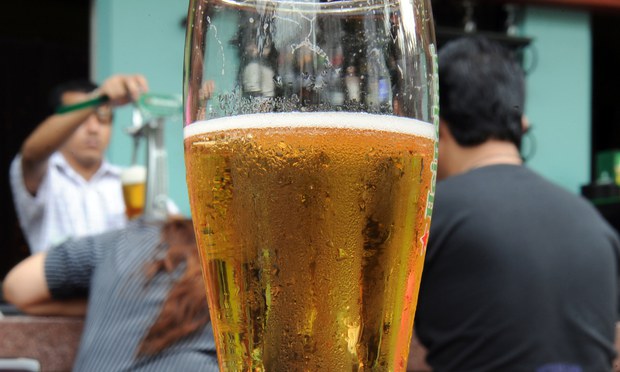Beer Festival Targeted by Militants: Malaysian Police Chief
2017.09.21
Kuala Lumpur
 A bartender draws beer from a tap in Kuala Lumpur’s Bukit Bintang nightlife district, July 20, 2010.
A bartender draws beer from a tap in Kuala Lumpur’s Bukit Bintang nightlife district, July 20, 2010.
Police on Thursday said militants planned to sabotage Malaysia’s biggest beer festival, which was canceled earlier this week after an Islamic party warned about how celebrating the alcoholic beverage could encourage immoral behavior.
Citing security concerns, Malaysia’s police chief said his department would not have allowed The Better Beer Festival 2017 to go ahead in Kuala Lumpur next month, even if the city council had granted a permit for the event.
On Monday, the council (DBKL) announced it had denied an application from the organizers to stage the event on Oct. 6 and 7, but without explaining why.
“There is information which revealed that militant groups were planning to sabotage the festival as they regard the event as contrary to their struggle,” Police Inspector-General Mohamad Fuzi Harun said in a statement.
Police had also obtained intelligence that “some parties” planned to disrupt the beer fest and this could “lead to a security situation,” Fuzi added. He did not name any militant groups or other parties that could cause havoc at the event.
On Monday, festival organizers announced the annual event’s cancellation for the first time since the beer fest began five years ago. Organizers were anticipating that about 6,000 people would gather for the two-day event featuring 250 beers from at least 43 breweries around the globe.
“At our meeting with the officials at the Dewan Bandaraya Kuala Lumpur [the city council], were instructed to cancel our event as there are issues with the licensing,” MyBeer, the festival’s organizer, said in a statement.
“We were further informed that the decision was made due to the political sensitivity surrounding the event,” it added.
Multi-religious and multi-ethnic Malaysia is home to about 19.5 million Muslims, who make up more than 60 percent of its population. Buddhists, Hindus and Christians make up the rest, but religion and race are sensitive issues in the country.
Promoting sinful behavior
A controversy around the beer fest arose among Malaysian Muslim groups earlier this month, when a senior official with the Pan-Malaysian Islamic Party (PAS), Riduan Mohd Nor, described the festival as a “vice party” that would encourage consumption of alcohol – which is outlawed for Muslims in the country – and sex.
“The festival would turn Kuala Lumpur into the largest vice center in Asia,” the party’s central committee member said.
The decision by the DBKL to deny the festival a permit irked non-Muslim Malaysians, and NGOs called on city hall to reverse it.
“It is a slippery slope when ‘political sensitivities’ is cited for banning perfectly legal activities. Diversity and tolerance are our strengths. Don’t let narrow-mindedness and intolerance destroy that,” Simon Lim Seng Chai, a board member at the Center for a Better Tomorrow, said in a statement.
In recent years terrorist groups have targeted some establishments where alcohol is made or consumed, according to local authorities.
In 2014, Malaysian police said they foiled an Islamic State-linked plot to bomb a Carlsberg factory in the country. But in June 2016, IS claimed responsibility for its first successful attack on Malaysia soil when assailants mounted a grenade attack that injured eight patrons at a nightclub outside Kuala Lumpur. Two men were convicted and sentenced to 25 years in prison each over that attack.
On Thursday, a senior opposition leader questioned the national police chief’s statement about the festival.
“Two weeks before the 60th Merdeka [Independence] Anniversary celebrations, the Perak police chief revealed that the Islamic State was planning to launch an attack in Perak during the upcoming Merdeka Day celebrations. Did the government cancel all Merdeka celebrations in Perak because of such intelligence reports?” Lim Kit Siang of the Democratic Action Party said, according to Malay Mail Online.
“Of course not, although the intelligence reports would have justified more police reinforcements at critical areas and greater police preparedness,” he said.







